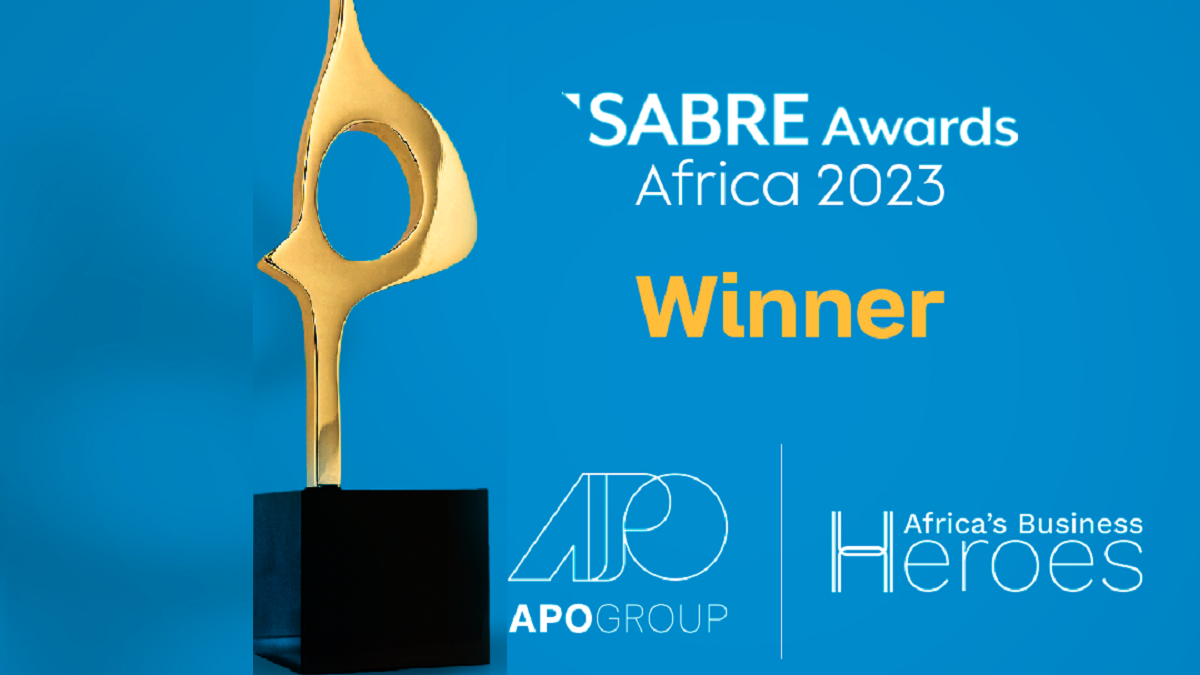APO Group’s integrated public relations and communications campaign for ABH focused on leveraging media opportunities across Africa and increasing brand awareness for the competition
JOHANNESBURG, South Africa, May 10, 2023/APO Group/ —
APO Group (www.APO-opa.com), the leading pan-African communications consultancy and press release distribution service, is thrilled to announce that its media and public relations campaign for the Africa’s Business Heroes (ABH) Prize Competition, a philanthropic initiative sponsored by the Jack Ma Foundation and Alibaba Philanthropy, has won the 2023 SABRE Awards for best campaign in Northern Africa and best campaign in Corporate Social Responsibility.
The SABRE Awards are the most prestigious and important awards in the public relations industry due to their global reach and recognition, as well as their comprehensive coverage of a myriad of public relations disciplines.
They recognise outstanding achievements and celebrate the best work in public relations across multiple regions and categories, including the Americas, EMEA (Europe, Middle East, and Africa), and Asia-Pacific, with the campaigns being evaluated by a jury of industry leaders.
The ABH programme (www.AfricaBusinessHeroes.org) promotes entrepreneurship in Africa by identifying and supporting outstanding business founders from across the continent. Each year since 2019, and to continue for a total of 10 years, the ABH Prize Competition selects 10 African entrepreneurs to participate in a live pitch event to a panel of industry leaders and compete for their share of USD$1.5 million in grant funding. Finalists also have access to mentorship, networking, training, and the opportunity to raise their profiles.
APO Group’s integrated public relations and communications campaign for ABH focused on leveraging media opportunities across Africa and increasing brand awareness for the competition. The primary goal was to support African entrepreneurs by encouraging more startups and founders to learn about ABH, understand the competition, and enter the awards.
This campaign has truly captured the public’s attention, showcasing the vast potential Africa has as a hub for the next generation of entrepreneurs
The campaign in 2022 received 21,000 applications from all 54 African countries. Additionally, 31% of the applications came from women entrepreneurs, reflecting the most diverse applicant pool yet in terms of geography and gender. Entrepreneurs as young as 19 and as old as 72 applied, further highlighting the inclusiveness of the competition.
APO Group’s comprehensive public relations and communications initiatives included strategic advisory and media training for all ABH spokespeople, media content creation and mapping, translation of media content, securing key media partnerships, coordinating, and managing targeted dissemination of messaging, media interview placements, social media strategy, and event support.
For the public relations campaign, APO Group wrote and distributed content on a pan-African level in different languages (English, French, Arabic, and Portuguese), generating more than 13,000 pick-ups, with a PR value of over USD$164 million. This was a significant increase compared to previous years, showcasing the campaign’s success in promoting African entrepreneurship.
“The Africa’s Business Heroes team shares our vision for the future of business in Africa, and together, our teams have worked tirelessly on raising the profile of the ABH Prize Competition,” said Nicolas Pompigne-Mognard (www.Pompigne-Mognard.com), Founder and Chairman of APO Group. “This campaign has truly captured the public’s attention, showcasing the vast potential Africa has as a hub for the next generation of entrepreneurs.”
“We are truly honoured to be recognised again this year with APO Group for our efforts to nurture and catalyse the pan African entrepreneur ecosystem. This award highlights the power and potential of the African entrepreneurial story and its ability to inspire others,” said Jason Pau, Executive Director of International Programs, Jack Ma Foundation. “We are excited to further our shared mission with APO Group to support and celebrate more African business heroes.”
APO Group invites all entrepreneurs across the African continent to apply for the next edition of the ABH Prize Competition before the May 12, 2023, deadline for a chance to win a grant, as well as training, mentorship, and networking opportunities, among the other benefits that this prestigious pan-African entrepreneurship competition brings. (Follow this link to register: https://apo-opa.info/3BbxIKT).
With its success in the 2023 SABRE Awards, APO Group continues to demonstrate its expertise and commitment to helping its clients achieve their communication goals and positively impact communities across the African continent.
Distributed by APO Group on behalf of APO Group
